What makes the best breakfast?
Can your intestines grow back? How can you measure your own stress levels? How do electric eels work? Scientists David Rothery, Sarah Madden and Gareth Corbett team up to answer an eclectic and electric selection of questions.
In this episode
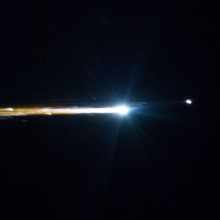
06:21 - How does the Earth's atmosphere slow down rockets?
How does the Earth's atmosphere slow down rockets?
We put this question to planetary scientist David Rothery...
David - We rely on Earth’s atmosphere to slow the rocket down. If you’re thinking of a re-entry capsule such as the ones Apollo used or such as we used to get back from the International Space Station, you have a blunt end. You have tiles to absorb the heat because the compression when you hit the atmosphere, heats the atmosphere so much that you’d burn the spacecraft up if it wasn’t properly protected, so you slow down using the atmosphere. It’s much easier to land on any planet with an atmosphere than onto an airless body where you do need to use rockets. But if people have been seeing the Falcon rocket landing back on the barge from which it has taken off, that is using rocket power to slow it down. So both techniques are used but you use less fuel if you use the atmosphere to slow you down and a parachute to make the final bit of descent, for example.
Chris - Thank you, David. And, of course, the temperature you reach is humongous, isn't it, because you’re doing adiabatic compression of the atmosphere in front of the capsule so you get a thousand degrees or so?
David - Absolutely. More than a thousand I think. It’s usually described as friction with the atmosphere, but it’s not friction, it’s not rubbing against it. It’s slamming into it and compressing it. That’s why shooting stars are glowing in the sky. It’s the compression of the air in front of the grain of dust coming in. It’s not friction, it’s compressing the air to make it hot.

07:52 - Can your bowels grow back?
Can your bowels grow back?
Consultant physician Gareth Corbett took on this gutsy question...
Gareth - The bowel does not grow back after you’ve had some of it removed and, obviously, there’s lots of different bowel operation that you can have. Some people have a bit of bowel removed and then they’ll have the two ends connected back together again. And some people have a bit of bowel removed and they’ll end up with a dreaded stoma bag, which a lot of people worry about. But we have fantastic nurses which help look after patients and get them used to it, and the vast majority of people with stomas live with them very well. So it’s not really something to be afraid of or worry about, it’s a consequence of an unfortunate condition you might have had to end up having that surgery.
What we do see though that is interesting is in patients where they have a limited amount of colon left. For example in the condition inflammatory bowel disease conditions you sometimes have large amounts of bowel removed and then the small intestine is reconnected to a small bit of colon. You do see that the small bowel almost turns itself into colon - there’s changes in the appearance of it. It still does maintain a sort of cellular architecture like a small bowel, but when we look at it endoscopically you get the sort of muscular appearance like it’s almost reforming and it helps people store stool longer basically. Because the large bowel’s a stool storage mechanism so we’re not continually having to rush to the bathroom and if you lose some of your colon then you will go the the loo more frequently. But the body does adapt to help that change over time after you’ve had such an operation.
Chris - Because people can actually get by with having quite a lot of it removed, can’t they?
Gareth - You can live without any consequences without any of your colon at all, so people who have had to have the whole lot removed are fine. In terms of your small intestine, that’s not quite the case. You can lose substantial amounts of small intestine but you do start to have nutritional consequences for that. People with super short parts of gut can start to have liver disease as a result of that. So losing small amounts of small bowel is quite serious. Again, going back to the inflammatory bowel disease conditions, such as Crohn's disease or Ulcerative colitis that people might have heard of, people with Crohn’s tend to have quite significant numbers of operations and bits of small removed, and we do get to a point in treating people like that where we say, that’s enough small bowel removed. We need to try and preserve as much as possible because they do end up having consequences in terms of getting food into them properly.
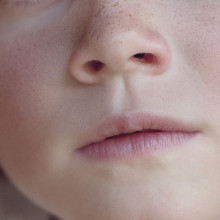
10:18 - Can you taste without smell?
Can you taste without smell?
Biochemist Sarah Madden revealed why your nose knows best when it comes to flavour...
Sarah - Someone wanted to know if you could taste food without smelling it. The thing is our tongues have five basic tastes so we have sweet, sour, salty, bitter and umami, but taste is kind of different from flavour. Taste is just when you put food on you mouth and you have a chemical reaction and you have a couple of those sensations that I just talked about. But smell also impacts on flavour so this is what the experiment is about. You can’t have complete flavour without smell so that’s what my experiment will hopefully demonstrate to these willing participants.
Chris - This is a question we got from someone called Lauren who wanted to know how we disentangle the two effects - the smell and the taste. What have you got in mind; what do you want us to do?
Sarah - I have a jelly sweet with me.
Chris - One for all three of us to share or do we get one each?
Sarah - I have some jelly sweets.
Chris - Do you want to dish them out then?
Sarah - I can dish them out.
Chris - Because David’s looking hungry…
Sarah - There you go David.
David - I spotted these when these arrived. I’ve been looking forward...
Chris - I’d love one yes please.
Sarah - The idea is to split it into two. We want to be proper scientists and have a controlled experiment.
Chris - Okay. I’ve got two halves.
Sarah - For the first half we need to make sure we hold our noses very tightly so we can’t smell. I want you to put in your mouths and try and eat it.
Chris - I’m holding my nose and I’m going to eat the jelly sweet.
David - What’s umami?
Sarah - It’s almost a meaty flavour. You’ve heard of MSG as well - it’s glutamate or something that you find in meat so it’s that kind of almost sort of savoury, meaty flavour that they have just started thinking about, and scientists have only recently discovered that one.
Chris - So let’s ask Gareth chomping away over there while holding your nose. Could you taste your jelly sweet while you were holding your nose?
Gareth - No, but I tasted it as soon as I let go of my nose.
Sarah - Yeah, that’s really interesting.
David - Exactly the same. I really was gripping my mouth quite tightly and I could not taste that. I released my nose, as Gareth spoke, and I was flooded with orange.
Chris - Flooded with flavour. So Sarah - explain…
Sarah - That’s really good that you guys noticed that. The point is that when we’re holding our nose we can’t smell, all we have is the taste and not the flavour, so we just taste the sweet sensation is all we experience. But, as we take our hands off our noses then suddenly we get the smell and hence the flavour. I’ve given you the second half in case you didn’t fully taste it as a little treat and reward...
Chris - I’m into that now. I’m now eating that.
Sarah - … for participating in the little experiment.
Chris - I didn’t take much encouragement. So the point is if you can’t get the air flow flowing down your nose because your holding it, it can’t carry those flavours being volatilised boiled off by the warmth of your tongue up to where the olfaction, the smelling bit that happens in the back of the nose. As a result, you can’t ‘taste’ anything?
Sarah - Yes, exactly. It gives you an understanding of those people who can’t smell, like people with anosmia it’s called. So you can imagine what their experience of food must be like. It must be very difficult.
Chris - I used this trick when I was little because I hated brussel sprouts. I really like them now but I used to hate them and so I found the five year old me discovered if I held my nose I could eat brussel sprouts with impunity. Because most of that strong flavour is very sulphurous compounds that then boil up to the back of your nose and you smell and call that taste.
Sarah - You’re destined to be a scientist weren’t you?
Chris - I clearly was. David?
David - So when we smell as we’re tasting, is it because we’re breathing out through our nose and drawing air from our mouth into our nose internally, or is our nose smelling what we’re breathing out?
Sarah - I would hypothesis - a combination. But it’s important to also emphasise that flavour is also a combination of sight and texture and heat. So it’s all things coming together.
Chris - Your brain is integrating all of these things together so that what we call “taste” is actually a mixed bunch of senses isn’t it I suppose?
Sarah - Mmm.
Chris - Thank you very much Sarah. So there you go, a little trick everybody, if there’s something very unappetising on your dinner plate, the way round this is hold your nose and then you won’t taste it.

16:02 - How can you measure stress?
How can you measure stress?
Gareth Corbett stressed that there's no easy answer to this question...
Gareth - I think stress, obviously, has physical and psychological outputs, if you like. So physically we know that our heart rate might go up if we’re stressed or our blood pressure might go up, we might start to sweat, our pupil size might change. But they are all sort of signs of what’s going on on the inside with increased hormones being released such as adrenaline and getting us ready for running away and that’s all a bit evolutionary really, just getting your body ready to fly away.
I’d like to dispel the myth that stress is bad though. There’s a law which is called Yerkes Dodson law which is basically like a bell curve that just shows that if you’re not very stressed you won’t perform very well. If you’re very, very stressed you won’t perform very well. If you’ve got a little bit of underlying stress your performance goes up as that stress increases. I think that’s useful for people to note - stress is not a bad thing.
The question about practical day-to-day stress measurement. There are scores you can do to determine your stress levels - tick sheets and things. But I did find out that you can get personal fitness monitors that now have stress detector parts on them, like your Fitbit or other electronic device. The only thing about those is it’s got to be a bit context specific because it’s just measuring physiological measurements. It’s just what’s your heart rate doing, how much sweat are you producing and so on, rather than knowing where you are at the time. Because you could just be running at the gym or running for the bus or something like that as opposed to being in a stressful situation at the time.
The other thing is we obviously have a way of looking for stress in the real environment and maybe you could use it at work, which the police use, which is a lie detector tests. They are a way of measuring physical observations to see whether people are lying which is, obviously, making them stressed, and they look for minute changes in physiological measurements to determine if someone’s not telling the truth. And that’s, I suppose, in a way a very practical way of measuring stress.
Chris - They look for galvanic skin responses, don’t they? That’s little bits of sweat on your skin that changes how well your skin conducts electricity.
Gareth - And measure your ECG at the same time, and measure your blood pressure during the test, all those sorts of things.
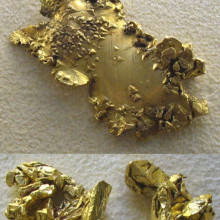
18:46 - Where do large lumps of gold come from?
Where do large lumps of gold come from?
Open University's David Rothery was going for gold to answer this question...
David - A supernova is the only situation when you can make substantial amounts of elements heavier than iron. It’s because the compression waves when the star is so massive it can’t support its outer parts anymore; it collapses inwards; it gets really dense, and a big explosion blows the outer parts off. When the pressure's really high you can fuse elements to atoms heavier than iron, among which is gold. Gold’s nothing special in this, but gold is among them.
Then you’ve got these particles of all kinds of elements which will be seeding space and that will form a cloud of gas and dust. And within such clouds is where stars and planets of the next generation of stars form. So, the material from which say the Earth formed would have a tiny amount of gold in it, but it won’t have gold nuggets in it, it will be isolated atoms of gold. When you formed a planet it will differentiate; the iron will go inwards; the rocky stuff will go outwards, and in amongst the rocky stuff will be individual atoms of gold. Then geology takes over and you have processes of distilling the crust. Maybe water coming in dissolving stuff, circulating around driven by internal heat and, atom by atom - gold’s a very inert element but it can form complexes with hydrogen sulphite and chlorine. But you get it into solution and then into places where it can come out of solution round some solid initial speck, and then you can grow a gold nugget atom, by atom, by atom. Rarely bigger than a speck of gold but, sometimes, it’s as big as a brick.
So the gold nuggets don’t come from space. They’re not formed in a supernova but the gold atoms are formed in a supernova and get concentrated by Earth’s geological processes.
UPDATE 19/10/2017- Since this was broadcast, an announcement from LIGO has revealed that it is, in fact, colliding neutron stars, not supernovae, that expel heavy elements.

20:55 - Why do antibiotics suppress my food intolerances?
Why do antibiotics suppress my food intolerances?
Gareth Corbett, digestion expert, crunched down on Olivia's query.
Gareth - It’s a great question actually. I think the first thing to talk about is what is food allergy and what’s food intolerance, because I find myself explaining this quite often to patients of mine? Probably the most serious type of food allergy is something, for example, a peanut allergy where you eat a piece of food and you have a widespread reaction to it. You develop rashes, difficulty breathing and so on. That’s a true allergy because the allergy part of the immune system’s been activated by eating that type of food.
Then you have sort of in-between intolerance and allergies. You have things like celiac disease which is a condition where a specific part of food leads to an immune reaction but in a particular place. It’s in the wall of the gut, not causing the whole of the immune system to go crazy.
Then you have intolerances to food. That’s where when we go looking for a problem we take biopsies from the bowel or have a look through with one of the cameras. We can’t really see anything wrong but people definitely develop symptoms when they eat certain types of food. That’s a massive group of people and those people end up being defined by the medical profession as having functional bowel disorders, which is a term that we use when we don’t really understand exactly what’s going on, but we can recognise the syndrome of symptoms that are all together.
What’s probably going on is all to do with the gut microbiota. We have millions, and millions, and millions of bacterial cells living inside our GI tract, and they live with us and we require them to survive. They help us digest our food and they help us sometimes produce important proteins and so on, so they are an important part of our lives. But sometimes things aren’t quite right and the pattern and the types of bacteria that you have growing in your intestine can mean that you don’t digest certain types of food in a way that you might expect, so you end up getting symptoms. People call them food allergies, but they’re almost certainly food intolerances.
What happens normally is that the bacteria metabolise the food and they produce gas. Gas stretches the bowel lumen and the tube of the bowel and that stretches and sends a pain signal up to the brain and says “help.” So you take antibiotics and you end up killing off some of those bacteria and probably by chance in Olivia’s case, the ones that were causing her to have a problem and then she can eat what she wanted. But the antibiotics won’t clear all of them so when she stops, the symptoms can come back again.
Chris - Because basically you relapse back to the normal spectrum of bugs that's right for you or which is normal for you?
Gareth - Yeah, perhaps. Although you don’t always do that and, in fact, what’s more common to see is somebody who’s had a course of antibiotics and then they end up with symptoms afterwards.
Chris - Yes. I’ve got several acquaintances who’ve claimed of this very problem.
Gareth - Yeah. And, of course, the ones that are really big in the NHS is this thing called Clostridium difficile which shuts hospital wards. It's something all hospitals have to report on their Clostridium difficile rates and all that sort of thing. But that’s an antibiotic induced problem rather than an antibiotic preventing problem.
There are other things that alter the system, in the GI tract. One of the things is probiotics. There is good evidence that that helps irritable bowel syndrome.
Chris - So these bugs do survive the journey through stomach acid because one criticism is that when you swallow these things it goes through battery acid in your stomach which deactivates a lot of these microbes and, therefore, the numbers that survive are probably quite small?
Gareth - That may be true for some of the stuff you buy on the supermarket shelves. But there are some products that you can buy as foodstuffs, not prescribed medicines, that contain very high volumes of the bacteria in freeze dried form and so they do make it through the gastric transit. But you are absolutely right, large numbers of the bacteria won’t make it through that acidic environment.
Chris - Where do you stand on transpoosion? The whole idea about crapsules that you pop a pill and it’s a healthy spectrum of bugs to put back in your gut? Everyone's’ grimacing. Sarah, you had your hand up just now, is this something you would indulge in?
Sarah - I have seen it done. Is it freeze dry the poo - is that right?
Chris - Are you actively pursuing this Gareth?
Gareth - We did have what we call a fecal transplantation service at Addenbrooke’s. It might make you laugh. But the bottom line is - one of my colleagues will thank me for saying this, it’s stealing his line. That the stool is basically its own organ. It’s an organ of bacteria. The main therapeutic use is for treating C. diff that won’t get better with antibiotic treatments. The results are phenomenal for people who won’t get better, they just get better the next day after having this. Whether it will end up being a good treatment for things like irritable bowel syndrome and so on, there isn’t any data that’s firm enough to support that. So I wouldn’t support the recreational use of stool tablets, shall I say.
Chris - I wonder if many people indulge recreationally? It’s going a step too far.
Gareth - In the same way that people take vitamin tablets and things like that as a kind of lifestyle thing to do to try and make themselves feel better.
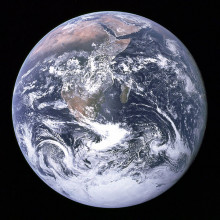
26:18 - Was the Earth ever totally underwater?
Was the Earth ever totally underwater?
David Rothery from the Open University took on Goeff's question...
David - Was the Earth ever covered in water? Very definitely yes, if you’re prepared to accept water as the substance H2O. Because there have been times when the planet has been entirely covered by ice, that’s both the land masses and the oceans covered by ice from pole to equator. These are called the ice house world conditions, the most recent of which was about 635 million years ago so just before large amounts of multi-cellular life. Extreme climate events covering the Earth in solid water - yes.
The questioner was probably thinking about liquid water. Now land masses don’t so much rise and fall as, at the moment, the continents split apart and rearrange themselves and the amount of continental material is scarcely changing over time. But if you go back about 3 billion years ago, there wasn’t much continental crust, maybe just a few ocean islands. So virtually the whole planetary surface would have been covered by liquid water at those times when it wasn’t frozen. So, very deep in the past a few islands in amongst the global oceans. That’s as close as we get to a planet we get covered in liquid water.
Can they occur elsewhere? Yes, there are certainly many worlds in this solar system - moons of Jupiter and Saturn which are ice at the surface, rock underneath, and maybe an ocean sandwiched in between. But to go to bodies covered in liquid water, well these are known as water worlds. Probably from the science fiction movie but it’s an obvious term. We think planets that are rocky but have a greater mass than the Earth (twice to ten times the mass of the Earth) are going to have so much water as well. But by the time the water’s squeezed out of the rock, it’s going to be such a deep ocean that you’ll never have land masses sticking above the surface.
So we are expecting to find water worlds among the exoplanets and we’ve got planets round 2 or 3 thousand stars now. Most stars in our galaxy we know have planets now, so some of them are going to be water worlds and we think we are identifying some of them by their size and mass.
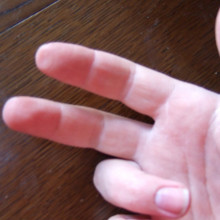
29:19 - Quiz: Do longer fingers have faster-growing nails?
Quiz: Do longer fingers have faster-growing nails?
with David Rothery, Open University, Vinnie Ferarra, BBC, Sarah Madden, University of Cambridge and Gareth Corbett, Addenbrooke's Hospital
The panel are put through their paces with a fiendish quiz, with David Rothery and Gareth Corbett going head to head with Sarah Madden and special guest Vinnie Ferrara.
Chris - This week, our quiz will be split into 3 rounds, and you can confer. We’re going to have two teams. We’re going to have Gareth and David. Team 2 is going to be Sarah, and because we unfortunately had one person short this week Sarah, we’ve found you somebody. Vinnie has kindly agreed to pop in and Vinnie’s going to be your sidekick.
How your science Vinnie, is it good?
Vinnie - I’m sorry. I’m not going to do very well for you here Sarah.
Chris - Moral support probably.
Sarah - No, I’m very grateful.
Chris - You’re a big enough brain Sarah, I’m sure you’re going cope adequately well.
TEAM 1 - Chris - What number is opposite the 3 on a dice?
David - It always adds to 7 we think so we’re agreed it’s 4.
Chris - Well they’re off to a good start it’s indeed 4. Opposite sides always add up to 7.
TEAM 2 - Chris - If a bat and a ball together cost £1.10 and the bat costs £1 more than the ball, how much does the ball cost?
Vinnie - £1.10. If it costs 10p and it’s £1.00 more.
Sarah - The bat costs £1.00 more than the ...ahhh.
Vinnie - Yeah.
Sarah - I can do this.
Vinnie - I’ll let you take the flack.
Chris - that’s very gentlemanly of you Vinnie.
Sarah - Sorry, this is so stupid. We can just sacrifice it - I’m sorry. I know it’s really easy. My simultaneous equations are just going out the..
Chris - It’s actually a trick question because of course it’s 5p because you add £1 to get £1.05 for the bat and the total is £1.10.
I fell for it too Sarah. When I first heard that a few years ago the gut reaction you immediately get it wrong.
So we’ve got David and Gareth out in the lead at the moment. Back to you...
TEAM 1 - Chris - The 2017 Nobel Prizes are in the news at the moment and with that in mind I would like to know what the Swedish scientist Alfred Nobel, after whom the prize is named, is famously credited with inventing?
David - It was dynamite wasn’t it? I was worried you were going to ask me who’d won the prizes this year and that would have show us up awfully. But I think he invented dynamite - some explosive.
Gareth - I’m happy to go with you.
David - What was he famous for is the question?
Chris - Yeah.
David - For inventing dynamite.
Chris - You’re on fire - a bit like his dynamite. It was indeed dynamite - Nobel invented it in 1867 and originally sold dynamite as "Nobel's Blasting Powder" but decided to change the name to dynamite, from the Ancient Greek word dunamis - power or strength. So they knew all about branding even in Nobel’s day.
So two points so far to David and Gareth.
Right. Let’s see if you can salvage your reputation a little bit you two.
Sarah - I know. ‘I'm just so annoyed with myself but it’s fine.
TEAM 2 - Chris - In 1901 a group of divers discovered what is believed to be an ancient analogue computer made from an intricate combination of gears. It could predict eclipses. What was it called?
Vinnie - I have no idea.
Chris - Do you want to have a guess. Is David helping you?
Sarah - Yeah, he’s cheating. I don’t know it so I can pretend to play it cool.
Chris - Hang on a minute.
Sarah - I can’t read his handwriting.
Chris - David, what have you written?
David - I’ve written antikythera mechanism.
Chris - The device is called the antikythera so plus one to this team for the correct answer and minus one to the other team for cheating and helping. So now the scores are even.Now we have an interesting position because everyone is on the same score. So we’re into the final round - everything to play for. I’m so glad you cheated David and enabled me to dock you a point.
Bit of detail about the antikythera, it dates from the time between 205BC to 70BC; experts think it may have been designed by Hipparchus who is considered the founder of trigonomics since it uses his theory to track the motion of the moon. So it was an ancient time-keeping and celestial prediction computer.
TEAM 1 - Chris - True or false, the Mongolian Pepper Mouse is a small rodent that lives in central Asia known for a defensive ability to spray its saliva which contain capsaicinoids - the chemical that makes chillies pungently hot and burning. What do you think?
Gareth - It sounds like the sort of thing that would be true to me.
David - It’s probably a trick question. It’s not in it’s saliva. Go for it.
Gareth - We’ll say true because it sounds plausible.
Chris - We completely made that one up actually. There is no such thing as a Mongolian Pepper mouse. But we did cover on this programme back in 2006, the discovery by David Julius from the University of California, San Francisco, the discovery of the component of a venom of a certain tarantula that does activates the very same receptors as capsaicin which you find in chillies, so when you get bitten by the spider it burns in the same way as if you’d rubbed chilli peppers on your wound.
So, no points to you so far. Let’s see if you’re going to end the day level pegging or if the other team can snap victory from the jaws of near defeat.
TEAM 2 - Chris -In humans, the longer your fingers, the faster your nails grow? Is that fact or fiction.
Vinnie - That doesn’t seem like something that should be right.
Sarah - No. So if your fingers are longer I think it will be further from your - I mean it’s a greater distance so they’ll grow slower.
Chris - You’re going for slower. So you think it’s the wrong way round.
Sarah - I think…
Chris - So you think it’s wrong.
Sarah - Yeah.
Vinnie - Yeah.
Chris - No actually it’s true - That is true. In mammals, the rates of nail growth are proportional to the length of the terminal phalanx of the digit, that means the end bit of your finger beyond the last joint and so your index fingernail grows slightly faster than your small fingernail. And your fingernails grow about four times faster than your toesnails. And your nails’ average rate of growth is about 3mm per month.
Which Geologist David would know is roughly the same rate at which the continental plates of Eurasia and America are moving apart because of seafloor spreading.
David - It also explains why I don’t have to cut my toenails as often as I have to cut my fingernails.
Chris - That’s right, yeah.
David - I’ve been observing this as a phenomenon thing and surely I’ve got to cut my toenails as well?
Chris - Ever the scientist.
David - Now I realise I don’t have to and I understand why now. It’s brilliant.
Chris - I’m glad we educated you.
Thank you and that also means that no-one goes home the winner. Everyone’s even stevens so that’s wonderful.
Thank you very much and thank you Vinnie for stepping in so well.
Vinnie - You’re welcome. I treasure myself on knowing absolutely nothing.
Chris - Well, at least we had an even balanced team,didn’t we?
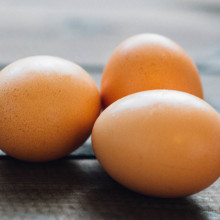
36:15 - Does protein for breakfast keep you full?
Does protein for breakfast keep you full?
Chris Smith put this question to digestion specialist Gareth Corbett.
Gareth - There is medical evidence that shows that a higher protein diet will make you feel fuller for a lot longer. That’s been done in a meta-analysis, so that’s a study of lots of different studies to be able to tell us if that’s the case. That was based on looking at what people ate and then they scored their fullness in these various studies and so that’s been shown to yes, it does make you fuller for longer. But the more interesting question is actually why does it make you feel fuller longer rather than does it or does it not? Because anybody who’s a regular bodybuilder would answer that question of yes, of course it does because that’s what I do for my diet.
There is some science behind this. First of all just to think about how protein digest, because proteins are complex molecules made up of lots of amino acids. As you break them down, they become polypeptides, which are slightly longer chains of amino acids and peptides which is two or more amino acids, and then you have amino acids on their own. They’re basically the building blocks of life so we have to eat protein because that’s what most of our cells are put together.
Chris - It’s what we’re made of, isn’t it?
Gareth - It’s what we’re made of, exactly. We eat protein in the form of meat, eggs, for example and our body starts to break it down in the stomach with enzymes until it gets to its most simple form. Then it goes into this circulation through the wall of the bowel up into the liver called the” portal circulation.” Now the portal vein is a really important blood vessel. It carries basically all the stuff that goes into our mouths into our circulation via the liver which is like a big factory in the body; it does lots of stuff. It seems that along the portal vein there is a type of receptor which is like a little plug socket, if you like, which seems to be activated to say “I am full - I am satiated.” And it seems that that might be the mu-opioid receptor within the portal vein for those who are a bit more interested in it. It seems that by protein binding on those receptors you get an effect where the brain goes “oh, okay, I’m now full up.” So it seems to be something going on in the portal bloodstream as opposed to something going on in the GI tract, which is actually really interesting.
Chris - So would the ideal breakfast then be something like egg? Because people always used to say “go to work on an egg.” That’s got a lot of protein in it. Would that be a good choice to have then?
Gareth - Based on the fact that we know that protein will make you feel fuller longer, it should keep you locked up till lunch, if you like, better than Shreddies, which is a carbohydrate breakfast.
Chris - What effect does that have? If you have a cereal rich, a very carbohydrate-rich breakfast. People usually add a bit of supplementary sugar to that as well. Does that sort of end up leaving you with a rebound hunger pang later?
Gareth - Yeah. And they pour fat over the top as well don’t they in the form of milk.
Chris - Well there is that and then there’s the whole kind of fruit juice that goes with it. A big dose of sugar with that too. Is there an impact of that?
Gareth - Yes. Carbohydrates are definitely processed much quicker and with carbohydrate diets you do feel fuller for less time compared with protein. So if you want it to say fine till lunch then I would have thought an egg is a reasonable thing to eat.
Chris - So, omelette, scrambled egg, and boiled egg and bacon. I’m doing my bit for the egg industry. With a bit of bacon on the side. There’s Gareth’s prescription as a gastroenterologist breakfast - a good way to start the day.
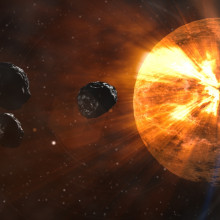
39:36 - Why are there no planets in the asteroid belt?
Why are there no planets in the asteroid belt?
Planetary scientist David Rothery took on this planetary puzzle...
David - I think you’re pretty much on the ball there David. Most scientists are pretty sure that it was Jupiter that stopped a planet growing where the asteroids now are. There clearly was planet-forming material all the way from near the Sun outwards to Jupiter and beyond and it would clump together into larger and larger bodies, eventually planet-sized bodies. But too close to Jupiter and Jupiter’s gravity would stir up the orbits of the bodies just inside its orbit, which is where the asteroid belt is, and cause the collisions between such bodies to be too energetic to allow materials to clump together, so no very large bodies grew. The largest bodies there today are less than about 1,000 kilometres across. So they’re stirred up and most of the material has, in fact, been lost because of Jupiter. We couldn’t make a planet now if we stuck all the asteroids together. It’s about a hundredth of an Earth mass in terms in total. It’s a surprisingly small amount even though there are thousands of bodies there.
Chris - Where’s it all gone? Has it become asteroids and impactors that rained down on us in the early phases of the solar system then?
David - If we’ve lost about an Earth mass or more of material from where the asteroid belt is. A lot of it’s been scattered out of the solar system. Some scattered inwards and would have hit Mars and the Earth and Venus and Mercury, and doubtless, some has been gobbled up by Jupiter. We’d scarcely notice it because Jupiter is 318 times the mass of the Earth. But Jupiter stirred stuff up and that’s what stopped a planet growing between Jupiter and Mars.

41:35 - How related am I to my siblings?
How related am I to my siblings?
Chris Smith put this to biologist Sarah Madden...
Sarah - It’s a really interesting question. I think the short answer - it’s a little bit complicated as many things are in science. You are 50% related to your parents, you are 50% related to your children. When it comes to siblings it’s - if we’re being all scientific about it - it’s 50% on average. The reason that is is that when you inherit the DNA from your parents, each chromosome that you have from each parent, there’s a bit of scrambling. So if you comparing different siblings they could take different parts of that chromosome and so it’s possible for you to be taking the same parts or completely different parts. So that’s why is 50% on average.
But I think it’s kind of cool to remember that this is relatedness and not the genetic similarity. So that would be the different bases that make up your DNA because just two random humans are 99.5% the same in terms of the DNA sequence. So basically, you and your family are, if you’re going to estimate 100% the same, which sounds crazy. But I think it really shows evolution in the fact that if you take two random things like a banana and a human, they are 50% the same in terms of the DNA sequence. Obviously, this is not relatedness - we’re not saying we’re related to bananas but the DNA sequence.
Chris - So, the chemical recipe book in our cells is basically 50% of the genes that are running a banana cell are also being used in your cells to make your metabolism work as well?
Sarah - Yes, so the DNA. It’s crazy.
Chris - It is, isn’t it? Not that you’re related to a banana or anything.
Sarah - No. Especially after the quiz you may think I am.

43:54 - What is electromagnetic hypersensitivity?
What is electromagnetic hypersensitivity?
Gareth Corbett unpicks the controversy of this condition...
Gareth - Electromagnetic hypersensitivity is the production of symptoms of all sorts that people complain of as a result of an exposure to an electromagnetic field of some kind. That could be something produced by an electricity pylon, or a wifi network at home, or your mobile phone next to your ear. People are describing things like headaches, nausea, aches and pains, all sorts of different things. Visual disturbances, taste disturbances, as a result of exposure to electromagnetic fields.
It’s a bit controversial because the symptoms are pretty nonspecific and they’re not reproducible from person to person and there’s no, unfortunately, scientific basis that’s been discovered to support the hypothesis that electromagnetic fields cause symptoms in people.
Chris - So have people done trials where you do a blind trial, where you put someone in an environment and expose them or not expose them and they don’t know who’s being exposed, you don’t know who’s being exposed and you look at the symptoms and see if there is a correspondingly good history?
Gareth - That’s right. They’ve done it in a number of different ways. One is the most basic and you put somebody in a room and they try and tell you when they think the electromagnetic field is on or not. But probably more interesting than that is the concept of a “no-cebo” study which - it’s not the nicest thing to do - but you trick the person into thinking they’re being exposed but they’re not. So you tell somebody the box sitting next to them is emitting an electromagnetic field, but it’s actually a sham and then they tell you they’ve developed symptoms. So there really is nothing scientific to support the concept of electromagnetic fields causing symptoms in people.
That said, it isn’t something to completely poo-poo about in the medical world because we do put devices into people such as pacemakers, and people do have to think about electromagnetic fields that they might be exposing themselves to if they have one of those devices in.
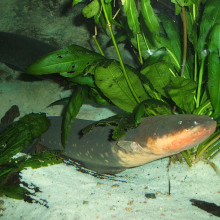
46:03 - How do electric eels get their energy?
How do electric eels get their energy?
Chris Smith answered this shocking question...
Chris - Well, the answer is they use modified muscle cells. They’re called electrocytes and they are strung together along the inside of the fish in the same ways that if you connected a battery end to end, and you connected the plus of one battery to the minus of another the voltages added together. So these electrocyte cells slowly accumulate voltage and over a very big eel you maybe get 500 volts and they’re discharged from just below the chin of the eel and its tail and so, the eel is basically a giant accumulator or battery. And it’s pumping ions of sodium and potassium in and out of these cells to generate those tiny voltages which together, over the course of these thousands of cells, sum to make those hundreds of volts.

46:47 - Could we ever live on Titan?
Could we ever live on Titan?
David Rothery from the Open University explained how we're unlikely to find a home from home on Titan...
David - There are many parts to Renee’s question. Titan is already warm enough for life if you go inside of it to where we’re pretty sure there’s an internal ocean of liquid water because we know the surface is de-coupled from its core and they rotate at slightly different rates. So, inside Titan, you could have Earth-like life or the kind of life we get at hot vents around the Earth’s ocean floor even at the present day.
To answer the question about what will happen when the Sun warms up towards a red giant, which won’t happen for about 5 billion years so no need to worry. Yes, Titan will probably warm up and probably not be swallowed by the Sun so it will still be there. It doesn’t need much warming before Titan will lose its methane lakes. I think if the surface temperature rises by about 5 degrees, that methane will all be lost. It’s just on the cusp of being liquid on Titan. It’s the only body, apart from the Earth, that we know of which has a liquid phase at the surface which will rain out of the sky and form rivers, and pool together in seas and lakes - it’s a marvellous place.
Well before the Sun has swelled up to a red giant and burnt the Earth away, Titan will have lost its liquid methane at the surface and most of the methane then will also be lost from the atmosphere, I expect, because it will be broken down by ultraviolet light into hydrogen which will escape, and carbon which will react with something or other. So, it will have lost its methane.
Will it become a body that we can go and live on if the Earth’s uninhabitable? We’d have to live on the rocky remains of what’s inside which may be buried in too much water. It rather depends on how much of that water is then lost. If we’re still around in 5 billion years time, we’ll have ways to travel from one star to another I would hope. Otherwise, what have we been wasting our time doing? I don’t think we’ll be looking to cling on by evolving into something which can live on Titan.
Related Content
- Previous Why is ice sticky?
- Next Making robot muscle










Comments
Add a comment